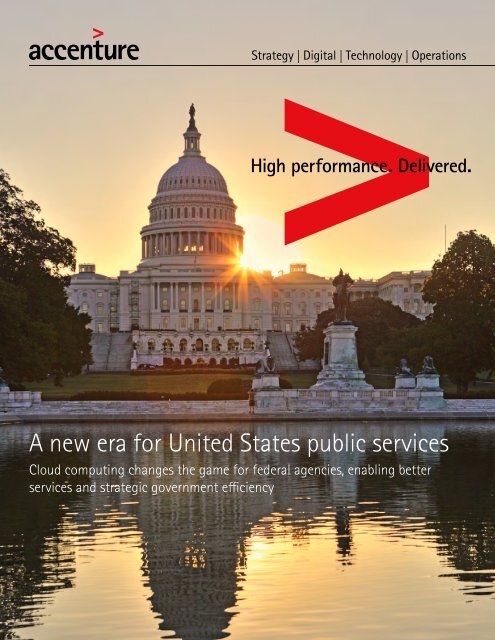Accenture-A-New-Era-for-United-States-Public-Services-Cloud-Computing
Accenture-A-New-Era-for-United-States-Public-Services-Cloud-Computing
Accenture-A-New-Era-for-United-States-Public-Services-Cloud-Computing
You also want an ePaper? Increase the reach of your titles
YUMPU automatically turns print PDFs into web optimized ePapers that Google loves.
A new era <strong>for</strong> <strong>United</strong> <strong>States</strong> public services<br />
<strong>Cloud</strong> computing changes the game <strong>for</strong> federal agencies, enabling better<br />
services and strategic government efficiency
Executive summary<br />
Ten key perspectives on cloud computing in US federal agencies<br />
Five challenges<br />
1. US federal agencies are facing conflicting financial pressures<br />
Federal agencies across the <strong>United</strong> <strong>States</strong> government are subject to two conflicting financial pressures. First, they need to<br />
invest large amounts of taxpayers’ money to provide public and citizen-centric services. Second, they have to work within<br />
ever-tighter budgets. One way to reconcile these two challenges is to harness new technology in cost-effective ways,<br />
serving citizens more efficiently and effectively. Given this imperative, the budget-constrained environment creates a positive<br />
context <strong>for</strong> cloud computing solutions, which offer greater cost flexibility based on use—including via consumption-based<br />
or “as a service” pricing deals—and the resulting shift from capital expenditure (CapEx) to operating expenditure (OpEx).<br />
2. Citizen demand <strong>for</strong> and expectation of efficient, easily accessible,<br />
digital public services are continually rising<br />
US citizens expect low-cost, high-quality public services, available via an ever-wider array of channels and devices, including<br />
mobile handsets and tablets. To meet these demands, agencies must move towards “digital government,” a goal that our<br />
research shows has support from growing numbers of citizens. This means agencies must take an innovative approach,<br />
ensuring that services are cost-effective, scalable and responsive to people’s needs, while also being flexible and secure.<br />
Again, cloud computing solutions can help meet all these requirements.<br />
3. Federal agencies’ IT functions must prevent “shadow IT” and “IT sprawl”<br />
“Shadow IT” involves executives procuring their own computing services—generally directly from external providers—<br />
to bring capabilities online quickly without explicit organizational approval. It’s a practice that can cause “IT sprawl,” whereby<br />
the range of devices and services within an agency expands, unregulated and uncontrolled. This can pose particular risks <strong>for</strong><br />
federal agencies, given the sensitive citizen data they handle. A similar trend occurred when PCs first hit the market and some<br />
users began purchasing their own devices; today there is a risk of this happening again with cloud solutions. Shadow IT and<br />
IT sprawl can be prevented in a cloud computing environment through sound governance and agile, responsive IT provision.<br />
4. Agencies face structural and cultural roadblocks to shared solutions<br />
Historically, government agencies owned and managed their IT in-house, partly because this was deemed the most secure<br />
approach. As a result, there are embedded structural and cultural barriers to sharing IT infrastructure and applications with<br />
other organizations, even including other government agencies. However, today’s demands around the cost, efficiency and<br />
integration of public services mean sharing services and solutions is increasingly imperative. <strong>Cloud</strong> computing can provide<br />
a solution to sharing services and solutions in a controlled, cost-effective and secure way.<br />
5. Concerns over data privacy and regulatory issues are barriers to cloud adoption<br />
Concerns over the security and privacy of sensitive agency and citizen data present challenges to federal agencies’ cloud<br />
adoption programs. However, these worries are receding with the effective use of cloud computing by various agencies<br />
and the successful rollout of initiatives such as the Federal Risk and Authorization Management Program (FedRAMP).<br />
At the same time, cloud security is constantly being improved as the relevant technologies are enhanced. We believe<br />
that moving to cloud computing can, in some circumstances, actually increase security, as it can remove any existing<br />
weak spots and enable tighter controls to be introduced across the whole IT picture.
Five opportunities<br />
6. <strong>Cloud</strong> computing will help make digital government a reality<br />
Digital technologies offer significant opportunities to change the way government works, resulting in greater efficiency<br />
and the development and delivery of public services that are more responsive to the needs of individual citizens. <strong>Cloud</strong><br />
computing has the potential to support both of these goals by introducing four key benefits: lower capital and operating<br />
costs; flexible capacity based on need; the ability to bring new services to market quicker; and high-per<strong>for</strong>mance<br />
computing power. Through these attributes, cloud computing can underpin the benefits of digital technologies and<br />
bring key advantages in delivering low-cost, high-quality public services.<br />
7. A new landscape <strong>for</strong> public sector cloud computing will evolve<br />
When it comes to the cloud, a public service organization can choose to be one of three things: a user, a provider or both.<br />
We believe that the market will evolve to allow government agencies to decide what role is best <strong>for</strong> them. Already, large<br />
federal agencies are looking to use cloud-enabled plat<strong>for</strong>ms to provide lower-cost, higher per<strong>for</strong>ming shared services<br />
to other—generally smaller—agencies.<br />
8. <strong>Cloud</strong> computing will usher in a new way to run IT<br />
Moving to cloud computing will have a major impact on the way federal agencies source, provision and manage IT services.<br />
Instead of creating bespoke systems, the IT function will focus on choosing and managing preconfigured components,<br />
becoming a data custodian and services director <strong>for</strong> the agency—and possibly <strong>for</strong> other agencies as well, by providing<br />
a cloud management plat<strong>for</strong>m. There are also major impacts on talent; skills in IT service delivery needing to be blended<br />
with capabilities ranging from service strategy development to cloud supplier management.<br />
9. Leading agencies will develop and demonstrate robust cloud sourcing<br />
principles and strategies<br />
Security concerns mean that <strong>for</strong> most agencies, the first step toward adopting cloud computing is creating internally<br />
managed private cloud infrastructures via virtualization. From there, more and more agencies are progressing toward<br />
hybrid environments with elements of a community or even—in some cases—public cloud. Some agencies are also looking<br />
to extend the shared benefits further across government, by offering their own cloud solutions to other agencies. A further<br />
step would be managing or “brokering” third-party cloud services <strong>for</strong> other federal organizations. In the military domain,<br />
the US Department of Defense has created a potential model <strong>for</strong> the future by appointing the Defense In<strong>for</strong>mation Systems<br />
Agency (DISA) as its cloud services broker.<br />
10. Our eight recommended opportunities <strong>for</strong> cloud computing in federal agencies<br />
Digital government enabled, underpinned and powered by cloud computing promises huge benefits <strong>for</strong> US government<br />
agencies and citizens alike. To help realize these benefits, we recommend eight key steps <strong>for</strong> government agencies.<br />
• Proactively develop and implement a “<strong>Cloud</strong> First” strategy.<br />
• Recruit and develop cloud skills to enable the strategy.<br />
• Proactively set a style of IT governance that incorporates cloud solutions and enables a new cloud-enabled role <strong>for</strong> IT.<br />
• Invest in common cross-agency infrastructure, services and pilot projects.<br />
• Seek out and pursue individual opportunities <strong>for</strong> cloud-enabled federal services, including considering how public and<br />
private cloud might play a role.<br />
• Develop private clouds <strong>for</strong> now; think hybrid <strong>for</strong> the future.<br />
• Examine the potential to offer cloud management plat<strong>for</strong>m or brokering services <strong>for</strong> other agencies—or to go to other<br />
agencies to source required services.<br />
• Participate actively in moves to create a plat<strong>for</strong>m that incorporates government-wide services.
Biographies<br />
Gaurav Harnal<br />
Gaurav is a senior manager in <strong>Accenture</strong>’s<br />
Health and <strong>Public</strong> Service Technology practice.<br />
Based in Washington DC, Gaurav has worked<br />
with numerous commercial industry and<br />
government customers since joining <strong>Accenture</strong><br />
in 2003, delivering technical strategies and<br />
solutions <strong>for</strong> on-premise and cloud consumption<br />
on complex ERP trans<strong>for</strong>mation programs.<br />
Annette Rippert<br />
Annette Peterson Rippert is a Managing Director<br />
in <strong>Accenture</strong> Federal <strong>Services</strong>. Her organization<br />
delivers solutions leveraging the latest emerging<br />
technologies, as well as those based on<br />
established plat<strong>for</strong>ms such as Oracle, SAP and<br />
Microsoft. Ms. Rippert is the Federal strategy<br />
lead <strong>for</strong> cloud computing and mobility.<br />
Stephen Suggs<br />
Steve is a senior manager within <strong>Accenture</strong><br />
Federal <strong>Services</strong> and an <strong>Accenture</strong>-certified<br />
delivery dead and senior technology architect.<br />
Steve puts his 16 years of experience<br />
designing, developing, delivering, and<br />
supporting enterprise systems to work<br />
<strong>for</strong> federal civilian agencies, with a focus<br />
on cloud strategy and cloud brokering.<br />
Timothy Shea<br />
Tim is a Managing Director with <strong>Accenture</strong><br />
Federal <strong>Services</strong>. Tim has been with <strong>Accenture</strong><br />
since 1994 and has been working in the Federal<br />
Government space since 2000. Tim has led<br />
large infrastructure and application build and<br />
operations programs, including a recent build<br />
out of a private cloud <strong>for</strong> a large federal agency.<br />
For more in<strong>for</strong>mation<br />
To learn more about <strong>Accenture</strong> Federal <strong>Services</strong>’<br />
work with federal agencies, please contact:<br />
Jim Menard<br />
james.l.menard@accenturefederal.com<br />
+571 858 2893<br />
Annette Rippert<br />
annette.p.rippert@accenturefederal.com<br />
+1 571 414 2143<br />
Tim Shea<br />
timothy.p.shea@accenturefederal.com<br />
+1 571 414 5551<br />
<strong>Accenture</strong> Federal <strong>Services</strong> is a U.S. company,<br />
with offices in Arlington, Va., and is a wholly<br />
owned subsidiary of <strong>Accenture</strong> LLP. <strong>Accenture</strong>’s<br />
federal business serves nearly every cabinetlevel<br />
department and 20 of the largest<br />
federal organizations with clients at defense,<br />
intelligence, public safety and civilian agencies.<br />
About <strong>Accenture</strong><br />
<strong>Accenture</strong> is a global management consulting,<br />
technology services and outsourcing company,<br />
with more than 293,000 people serving<br />
clients in more than 120 countries. Combining<br />
unparalleled experience, comprehensive<br />
capabilities across all industries and<br />
business functions, and extensive research<br />
on the world’s most successful companies,<br />
<strong>Accenture</strong> collaborates with clients to<br />
help them become high-per<strong>for</strong>mance<br />
businesses and governments. The company<br />
generated net revenues of US$28.6 billion<br />
<strong>for</strong> the fiscal year ended Aug. 31, 2013.<br />
Its home page is www.accenture.com.<br />
About <strong>Accenture</strong> <strong>Cloud</strong><br />
<strong>Accenture</strong> is uniquely positioned to help<br />
organizations use the cloud <strong>for</strong> competitive<br />
advantage within a complex digital<br />
marketplace. With a full range of cloud<br />
services, from strategy and implementation<br />
to migration and a cloud brokerage, we help<br />
clients plan <strong>for</strong>, integrate and manage in a<br />
hybrid world where cloud and legacy systems<br />
co-exist. We combine those insights with<br />
our industry knowledge, delivery experience<br />
and diverse ecosystem to drive innovation<br />
and trans<strong>for</strong>m complex environments<br />
into high-per<strong>for</strong>ming digital businesses.<br />
<strong>Accenture</strong> has worked on more than 8,000<br />
cloud computing projects <strong>for</strong> clients,<br />
including nearly 70 percent of the Fortune<br />
Global 100, and has more than 10,000<br />
professionals trained in cloud computing.<br />
Copyright © 2014 <strong>Accenture</strong><br />
All rights reserved.<br />
<strong>Accenture</strong>, its logo, and<br />
High Per<strong>for</strong>mance Delivered<br />
are trademarks of <strong>Accenture</strong>.<br />
14-3568






